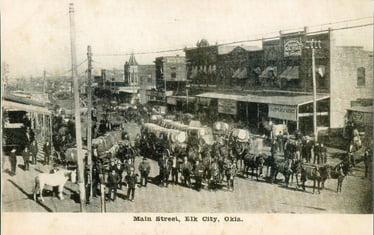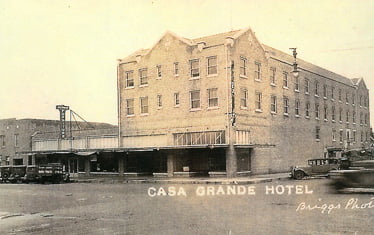A Rich History
Elk City’s history dates back to the days immediately following the opening of all surplus land of the Cherokee Outlet in 1892 when the first men made their appearance. Prior to this time, many early settlers had driven cattle over the “Great Western” trail from Texas going north, through the present town site of Elk City, to Dodge City, Kansas.
Probably the most important day in Elk City’s history is March 20, 1901, the date the first lots were sold by the Choctaw Townsite and Improvement Co., which had a few days earlier purchased the site for the business district from Mr. Allee.
By the date of the sale of the lots, March 20, hundreds of prospective purchasers had built a tent city. A legal document in the county clerk’s office certifies that the city was surveyed and platted into lots, blocks, streets, and alleys on March 18, 1901.
Originally called Crowe, the townspeople, eager for industry, renamed the town Busch, hoping to woo the favor of Adolphus Busch, so that the town might get a brewery. However, when the brewery did not materialize, the name Elk City was officially changed in 1901. Elk City was named after Elk Creek, which in turn had been named after an Indian Chief, Elk River, who lived in this vicinity years before.
The Railroad Brings Prosperity
The Company’s officials knew that the Choctaw and Gulf Railroad was coming this way and determined that Elk City’s present location would be an ideal spot for a town. On August 13, 1901, the Choctaw Railroad laid its last rail on the Choctaw route, connecting Elk City with the outside world. The first regular train service commenced seven days later and city folk rejoiced, predicting that the dugouts, claim shacks and prairie stables would soon disappear and be replaced by handsome residences, commodious barns, and granaries.
By January 1902, Elk City boasted more than 60 businesses and a population exceeding 1,000. Paving with bricks began in 1902 due to an effort from the many the city employed. Though not yet a year old, the town had become one of the largest in western Oklahoma. It boasted two hotels, many boarding houses, a church, two milling and elevator companies and two cotton gins.
* Excerpts taken from “Prairie Fire” a book published by the Western Oklahoma Historical Society and from information shared by Pat Sprowls, Director of the Elk City Carnegie Library. Photos courtesy of Mr. Don Nichols.





